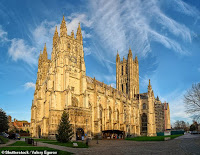Gervase of Canterbury claimed very humble origins for him, but the truth is his father became the archdeacon of Totnes and his mother later became a nun. He was sent by the Bishop of Exeter (Robert Warelwast) to Bologna to study law, where he met Peter of Blois, whom he would later hire, and the future Pope Urban III, whom he would seriously anger. Baldwin was chosen by Pope Eugene III (the "Homeless Pope") to tutor Eugene's nephew, a clear sign of papal favor. A few years later, Baldwin was back in England in 1155 in the household of Robert of Chichester, the new Bishop of Exeter.
Robert's successor, Bartholomew Iscanus, made Baldwin archdeacon of Totnes to replace his recently deceased father. John of Salisbury wrote to Baldwin, urging him to persuade Bartholomew to provide better support to Becket in the controversy with Henry II. Bartholomew and Baldwin were apparently leaning toward the idea that the king had authority over the church in England in certain matters.
Baldwin became a monk c.1170, and then abbot of a Cistercian monastery at Forde. His background in law meant that many legal disputes came to him after being sent to the papal Curia and getting remanded back to local experts. King Henry was impressed by his handling of a secular case in which he prevented a hanging.
His support of Henry in the Becket affair is likely why Henry was determined to have Baldwin succeed Richard of Dover as Archbishop of Canterbury, despite the monks of Canterbury putting forward three different candidates. For the problems that followed, see the link above.
One thing he did as Archbishop of Canterbury that was not controversial was preside over the coronation of King Richard I after Henry's death. It happens to have been the first coronation in England for which we have any details, thanks to Roger of Howden, and was intended to be elaborate, thanks to the new king's mother. Let me tell you how it went tomorrow.

No comments:
Post a Comment
Note: Only a member of this blog may post a comment.